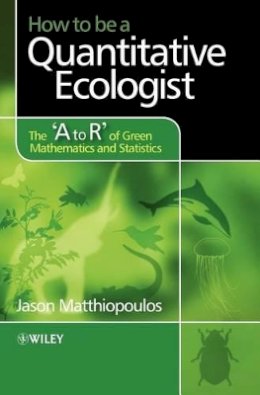
Stock image for illustration purposes only - book cover, edition or condition may vary.
How to be a Quantitative Ecologist: The ´A to R´ of Green Mathematics and Statistics
Jason Matthiopoulos
€ 187.80
FREE Delivery in Ireland
Description for How to be a Quantitative Ecologist: The ´A to R´ of Green Mathematics and Statistics
Hardcover. How to Be a Quantitative Ecologist is comprised of two equal parts on mathematics and statistics with emphasis on quantitative skills. A major component of this guide is computer implementation techniques, accompanied by computer practicals using the language R. Num Pages: 490 pages, Illustrations. BIC Classification: PBT; PBW; PSAF; RB. Category: (P) Professional & Vocational. Dimension: 244 x 179 x 35. Weight in Grams: 946.
Ecological research is becoming increasingly quantitative, yet students often opt out of courses in mathematics and statistics, unwittingly limiting their ability to carry out research in the future. This textbook provides a practical introduction to quantitative ecology for students and practitioners who have realised that they need this opportunity.
Read moreThe text is addressed to readers who haven't used mathematics...
Product Details
Format
Hardback
Publication date
2011
Publisher
John Wiley & Sons Inc United Kingdom
Number of pages
490
Condition
New
Number of Pages
490
Place of Publication
New York, United States
ISBN
9780470699782
SKU
V9780470699782
Shipping Time
Usually ships in 7 to 11 working days
Ref
99-50
About Jason Matthiopoulos
Jason Matthiopoulos, Lecturer in biology (University of St Andrews). He is a senior researcher in the Sea Mammal Research Unit and member of the Centre for Ecological and Environmental Modelling.
Reviews for How to be a Quantitative Ecologist: The ´A to R´ of Green Mathematics and Statistics
“For those looking through R books for something a bit more technical, this book will be an essential accomplice to mastering R.” (British Ecological Society, 1 April 2013) “The book is written in a style that is easy to read and for which one quickly forgets that the examples are essentially mathematical in nature. If you are an ecologist who...
Read more